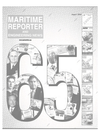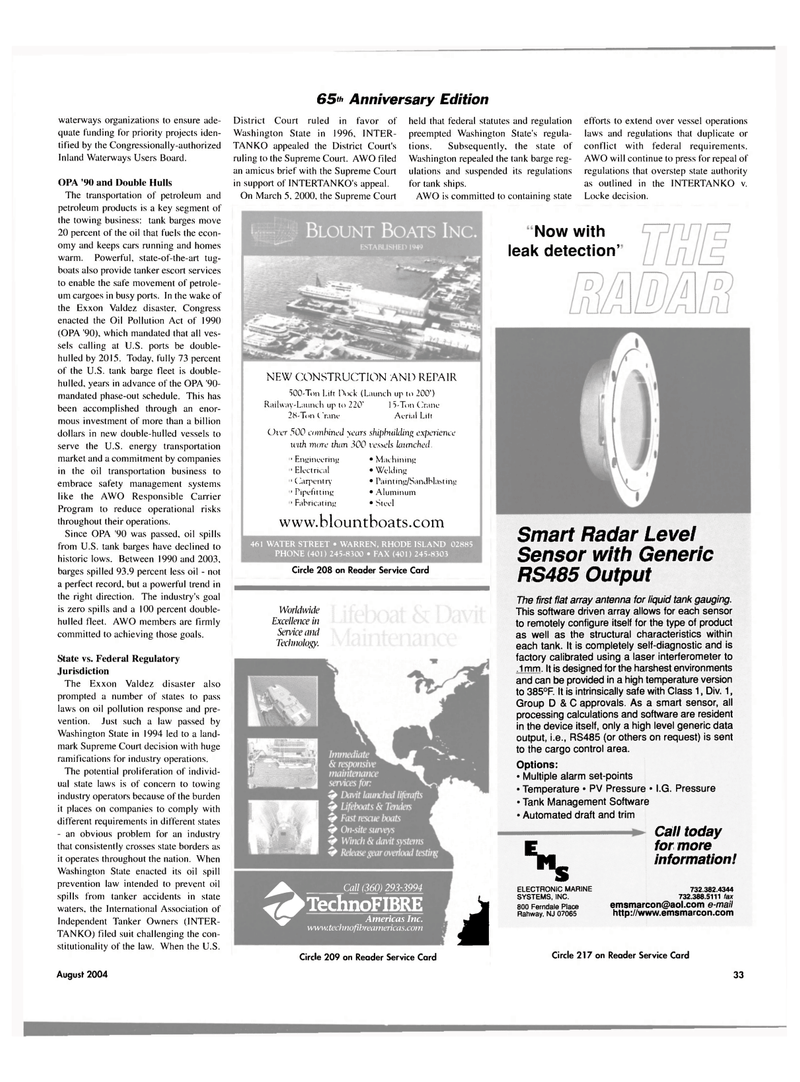
Page 33: of Maritime Reporter Magazine (August 2004)
65th Anniversary Edition
Read this page in Pdf, Flash or Html5 edition of August 2004 Maritime Reporter Magazine
65^ Anniversary Edition waterways organizations to ensure ade- quate funding for priority projects iden- tified by the Congressionally-authorized
Inland Waterways Users Board.
OPA '90 and Double Hulls
The transportation of petroleum and petroleum products is a key segment of the towing business: tank barges move 20 percent of the oil that fuels the econ- omy and keeps cars running and homes warm. Powerful, state-of-the-art tug- boats also provide tanker escort services to enable the safe movement of petrole- um cargoes in busy ports. In the wake of the Exxon Valdez disaster, Congress enacted the Oil Pollution Act of 1990 (OPA '90), which mandated that all ves- sels calling at U.S. ports be double- hulled by 2015. Today, fully 73 percent of the U.S. tank barge fleet is double- hulled, years in advance of the OPA '90- mandated phase-out schedule. This has been accomplished through an enor- mous investment of more than a billion dollars in new double-hulled vessels to serve the U.S. energy transportation market and a commitment by companies in the oil transportation business to embrace safety management systems like the AWO Responsible Carrier
Program to reduce operational risks throughout their operations.
Since OPA 90 was passed, oil spills from U.S. tank barges have declined to historic lows. Between 1990 and 2003, barges spilled 93.9 percent less oil - not a perfect record, but a powerful trend in the right direction. The industry's goal is zero spills and a 100 percent double- hulled fleet. AWO members are firmly committed to achieving those goals.
State vs. Federal Regulatory
Jurisdiction
The Exxon Valdez disaster also prompted a number of states to pass laws on oil pollution response and pre- vention. Just such a law passed by
Washington State in 1994 led to a land- mark Supreme Court decision with huge ramifications for industry operations.
The potential proliferation of individ- ual state laws is of concern to towing industry operators because of the burden it places on companies to comply with different requirements in different states - an obvious problem for an industry that consistently crosses state borders as it operates throughout the nation. When
Washington State enacted its oil spill prevention law intended to prevent oil spills from tanker accidents in state waters, the International Association of
Independent Tanker Owners (INTER-
TAN KO) filed suit challenging the con- stitutionality of the law. When the U.S.
August 2004
District Court ruled in favor of
Washington State in 1996, INTER-
TANKO appealed the District Court's ruling to the Supreme Court. AWO filed an amicus brief with the Supreme Court in support of INTERTANKO's appeal.
On March 5. 2000, the Supreme Court held that federal statutes and regulation preempted Washington State's regula- tions. Subsequently, the state of
Washington repealed the tank barge reg- ulations and suspended its regulations for tank ships.
AWO is committed to containing state efforts to extend over vessel operations laws and regulations that duplicate or conflict with federal requirements.
AWO will continue to press for repeal of regulations that overstep state authority as outlined in the INTERTANKO v.
Locke decision.
NEW CONSTRUCTION AND REPAIR 500-Ton l.itt Dock (Launch up to 200')
Railway-Launch up to 220' 15-Ton Crane 28-Ti>n t 'rant- Ac-rial Lift
Otvr 500 combined years shipbuilding experience with more than 300 vessels launched. ' Engineering ' Electrical ' Carpentry ' Pipe-fitting ' Fabricating • Machining • Welding • Painting/Sandblasting • Aluminum • Steel www.blountboats.com 461 WATER STREET • WARREN, RHODE ISLAND 02885
PHONE (401) 245-8300 • FAX (401) 245-8303
Circle 208 on Reader Service Card
Worldwide
Excellence in
Service and
Technology. ^^^ Call (360) 293-3994 ^^TechnoFIBRE
Americas Inc. www.technofibreamericas.com
Circle 209 on Reader Service Card
Now with leak detection' i
Smart Radar Level
Sensor with Generic
RS485 Output
The first flat array antenna for liquid tank gauging.
This software driven array allows for each sensor to remotely configure itself for the type of product as well as the structural characteristics within each tank. It is completely self-diagnostic and is factory calibrated using a laser interferometer to ,1mm. It is designed for the harshest environments and can be provided in a high temperature version to 385°F. It is intrinsically safe with Class 1, Div. 1,
Group D & C approvals. As a smart sensor, all processing calculations and software are resident in the device itself, only a high level generic data output, i.e., RS485 (or others on request) is sent to the cargo control area.
Options: • Multiple alarm set-points • Temperature • PV Pressure • I.G. Pressure • Tank Management Software • Automated draft and trim
X
ELECTRONIC MARINE
SYSTEMS, INC. 800 Ferndale Place
Rahway, NJ 07065
Call today for more information! 732.382.4344 732.388.5111 fax [email protected] e-mail http://www.emsmarcon.com
Circle 217 on Reader Service Card 33

 32
32

 34
34
